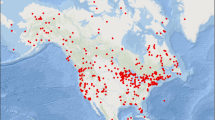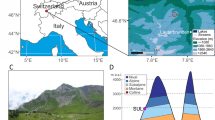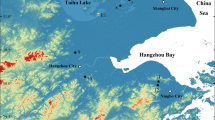Abstract
FEW pollen diagrams from Australian Quaternary deposits have been published and none of these extends beyond 10,000 BP. In north-eastern Australia, Lake Euramoo1 provides a pollen record from 9,700 BP to 1,500 BP and Quincan Crater2 gives evidence of vegetation changes from 7,250 BP to the present day. Here I outline results from a third site on the Atherton Tableland, Lynch's Crater, which provides a much longer vegetation record.
This is a preview of subscription content, access via your institution
Access options
Subscribe to this journal
Receive 51 print issues and online access
$199.00 per year
only $3.90 per issue
Buy this article
- Purchase on Springer Link
- Instant access to full article PDF
Prices may be subject to local taxes which are calculated during checkout
Similar content being viewed by others
References
Kershaw, A. P., New Phytol., 69, 785–805 (1970).
Kershaw, A. P., New Phytol., 70, 669–681 (1971).
Webb, L. J., Ecology, 49, 296–311 (1968).
Kershaw, A. P., thesis, Australian National University (1973).
Barbetti, M., and Allen, H., Nature, 240, 46–48 (1972).
Author information
Authors and Affiliations
Rights and permissions
About this article
Cite this article
KERSHAW, A. A long continuous pollen sequence from north-eastern Australia. Nature 251, 222–223 (1974). https://doi.org/10.1038/251222a0
Received:
Revised:
Issue Date:
DOI: https://doi.org/10.1038/251222a0
This article is cited by
-
Rapid global ocean-atmosphere response to Southern Ocean freshening during the last glacial
Nature Communications (2017)
-
Climatic change and Aboriginal burning in north-east Australia during the last two glacial/interglacial cycles
Nature (1986)
-
Chromosome differentiation, hybrid breakdown and the maintenance of a narrow hybrid zone in Caledia
Chromosoma (1980)
-
Record of last interglacial–glacial cycle from northeastern Queensland
Nature (1978)
-
Loss of boron from shells during weathering and possible implications for the determination of palaeosalinity
Nature (1977)
Comments
By submitting a comment you agree to abide by our Terms and Community Guidelines. If you find something abusive or that does not comply with our terms or guidelines please flag it as inappropriate.



